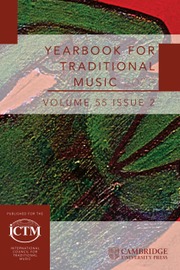Article contents
Improvisation in the Music of Korean Shamans: A Case of Degeneration Based on Examples from Chindo Island1
Published online by Cambridge University Press: 07 March 2019
Extract
This paper is one of the results of my ongoing diachronic investigations concerning the music of hereditary shamans on Chindo, an island in south-west Korea. My first field research on the music there was carried out in the early 1980s for a year; this work resulted in my dissertation (Park 1985). About twenty years after my first fieldwork, during the summers of 2000-2001, I made a number of trips back to Chindo, focussing on more specific issues, such as change, improvisation, and comparative analysis. A recent publication of mine (Park 2003) deals with the general nature of the changes the tradition has undergone. The present paper deals specifically with changes in improvisational practice.
- Type
- Articles
- Information
- Copyright
- Copyright © 2004 by the International Council for Traditional Music
Footnotes
I would like to express my gratitude to the guest editors of the Yearbook and the referees whose comments were very instrumental in helping me crystallise the thoughts in this paper. When I initially submitted the paper, I had some concerns as to whether my somewhat judgmental view of the changes in the tanggol's singing style as degeneration would be well received by the referees. Some audiences, upon hearing my previous oral presentations of this paper, had opposed my use of the word “degeneration”, suggesting that I use the word “change”. It seems now a scholastic fad to abandon any search for a “pure” or “authentic” thing per se and, instead, to show a relativistic attitude while focusing on process. Even though I agree that there is nothing we can regard as “pure’ or “authentic”, I do not think we should totally give up value assessments of the objects of our research. I realised then that I had to find a clear and convincing way to present my argument. Without the questions and comments of the Yearbook editors and referees, the result would have been less satisfactory.
References
References Cited
- 1
- Cited by


